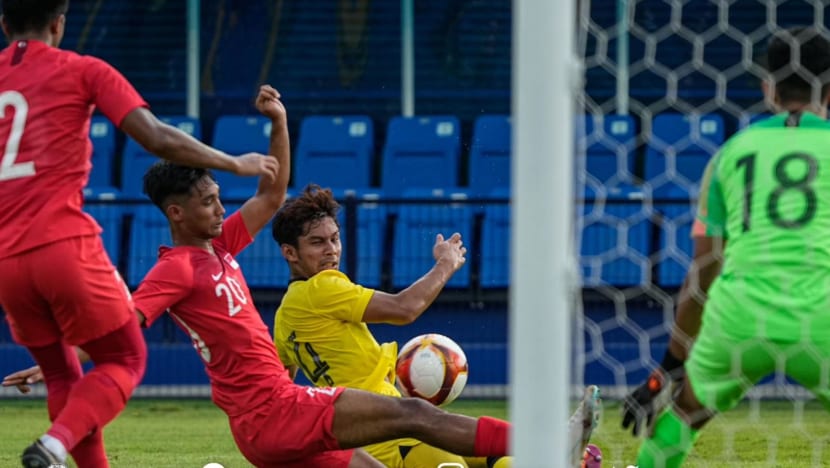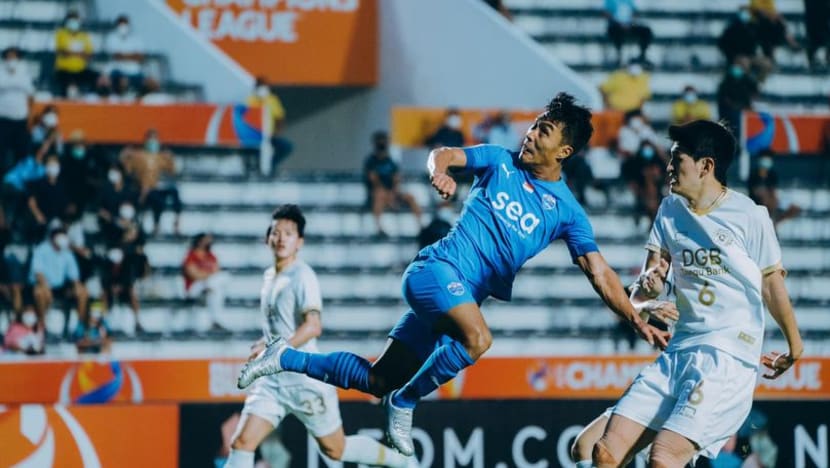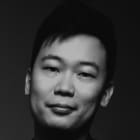Commentary: FAS recommendations raise more questions than answers for Singapore football
Singapore’s footballing authority needs to start addressing hot button issues that the masses want answers to, says sports enthusiast Alywin Chew.

Singapore and Malaysia players vie for the ball in their SEA Games football match on May 11, 2023. (Photo: Football Association of Malaysia).
SINGAPORE: The state of Singapore football has been an intense topic of discussion in recent months, following a shambolic showing by the Young Lions at the Southeast Asian (SEA) Games in Cambodia in May.
On Wednesday (Jul 12), it was announced that Singapore men’s Under-22 football head coach Philippe Aw had stepped down, with Nazri Nasir, the current assistant coach of the senior men’s national team, taking over the reins.
The announcement came just days after the Football Association of Singapore (FAS) unveiled 10 recommendations to improve our nation’s performance at the biennial SEA Games, including having individual development plans for key Under-23 and Under-22 players and having them focus only on two priority tournaments: The SEA Games and the AFC U23 tournament (which serves as the Olympic qualifier).
While I understand the need for the FAS to respond to the vitriol directed at them following the Young Lions’ 7-0 mauling by Malaysia, dishing out recommendations squarely aimed at improving Singapore’s performances at the SEA Games is short-sighted.
The recommendations - while a step in the right direction - also bring light to certain facts that are rather perturbing.
Take for instance the recommendation that players’ diets will be planned on occasions the FAS has control over their meals. Presently, according to the FAS, only hydration is monitored and healthy eating isn’t mandated.
In this modern age where sports science and nutrition have proved to be integral in athletic development, it’s startling that the FAS had not previously taken steps to ensure that our young footballers are eating well.
It’s also surprising that individual development plans were not already part of our footballers’ management. Is it not obvious that players have unique strengths and weaknesses and would require individualised training methods to improve?
A BAND-AID THAT WON’T HOLD
It almost feels as if the FAS is sticking a band-aid on a deep gaping wound.
The problem at hand isn’t just our poor showing at the Games. The problem is that our entire football development ecosystem is just not good enough.
The solution? Tackle the underlying issues that have created the problem.
One of the biggest problems is youth development. What are the concrete measures the FAS will take to address this? Besides improving the hardware, will the FAS also take steps to improve the “software” - inculcating a love for the sport among the masses and convincing parents that football can be a viable career for their kids?
I believe many football enthusiasts would like to know the answer to these questions.
This was also highlighted by Members of Parliament during a recent debate on sporting success.
“If our national athletes are expected to devote their youth to sports and to go all out to win at competitions in order to fly our flag high, we have to assure parents that professional sports is a viable career,” said MP Poh Li San (PAP-Sembawang) in her speech.
MP Gerald Giam (WP-Aljunied) had similar sentiments. “Becoming a professional athlete … is probably one of the most difficult paths a Singaporean can choose,” he said.
“Given that many high-performance athletes are of school-going age, if nothing is done to shift the youth sports development paradigm, we will continue to see many budding sports stars eventually fizzle out after they complete secondary school.”
RAISING STANDARDS
Football enthusiasts know that youth development is intrinsically tied to a nation’s domestic league because this is where young players get to hone their skills.
In other words, a strong domestic league produces good players.
Just how strong is the Singapore Premier League (SPL)? I believe the performances of our top local clubs at the AFC Champions League speak for themself.
Last year, the 3-0 win that Lion City Sailors registered over South Korea’s Daegu FC was the first victory by a Singapore side in the tournament since 2010.

The FAS also - perhaps unwittingly - admitted to this when it revealed that one of the reasons the Young Lions faltered at the SEA Games was because the tournament was played at an intensity that was higher than that of the SPL.
As such, will the FAS be doing anything to raise the level of intensity and competitiveness of the SPL? Could increasing the number of teams in the league work? Could the return of uniformed clubs like SAFFC and Home United to the SPL do wonders in driving up the league standard?
But instead of addressing this issue and coming up with suggestions on how the league can be improved, one of the recommendations listed is to tweak SPL regulations to allow U23/22 players to have more game time in the league.
Yes, increasing game time would certainly help players. But what is the point of having extra minutes on the field when the overall intensity of the SPL still lags far behind our regional counterparts?
Another pertinent issue that the FAS did not address is the future of the Young Lions, which has performed dismally in the SPL over the past few seasons. Should they stay? Or should they go?
Many believe the outfit should be disbanded and that the players would be better off honing their craft at the clubs. I beg to differ. Like Singapore footballing legend Fandi Ahmad and former FAS technical director Michel Sablon, I see the value in keeping the Young Lions together and having them train together as a unit.
To raise their standards, the FAS could once again allow for the team to feature foreign and overaged outfield players. This approach did, after all, prove to be relatively successful in the past.
SHOW OF INTENT
Earlier this week on Tuesday, the FAS made another announcement that I’m still struggling to wrap my head around - the Singapore men’s U22 football team will not take part in the upcoming Hangzhou Asian Games.
One of the best ways to gain experience and get better is to undergo more rigorous training and experience more competitive action.
How is the team going to improve without taking part in tournaments? Besides, does this move not contradict the measures the FAS claims it will take to help the Young Lions become accustomed to higher levels of intensity?
Indeed, racking up another humiliating loss at the Asian Games could deflate the morale of the Young Lions even further. But this surely cannot be the way the FAS views this situation, unless of course its main goal is not about fostering excellence but avoiding another barrage of criticism from the public.
Dear Young Lions, I say go out there and accept any losses with your head held high. Learn from your mistakes. Treat it as another learning experience. Besides, isn’t this what the sporting spirit is about?
Even after it became clear that she was going to be dead last in the 5,000m event at the recent SEA Games, rain-soaked Cambodian runner Bou Samnang didn’t simply pull out of the race. She huffed. She puffed. She eventually finished nearly six minutes behind the winner and was greeted with rapturous applause.
Samnang might have lost the race, but she ended up a viral sensation who won the hearts of people around the world.
Why do we celebrate athletes like Samnang but yet are quick to criticise the Young Lions?
I think this is because most people view the former as a symbol of the sporting spirit; an exemplar of grit and determination.
The latter, unfortunately, does not enjoy the same privilege. It is seen as a proxy of the FAS, an organisation that some would argue is the antithesis of the sporting spirit.
I don’t envy the position the FAS is in. But if it is going to win over its critics and prove that it has the iron in it to end Singapore’s footballing ennui, it needs to start by answering the hard questions.
Alywin Chew is a writer and editor who was previously a sports journalist at TODAY.























